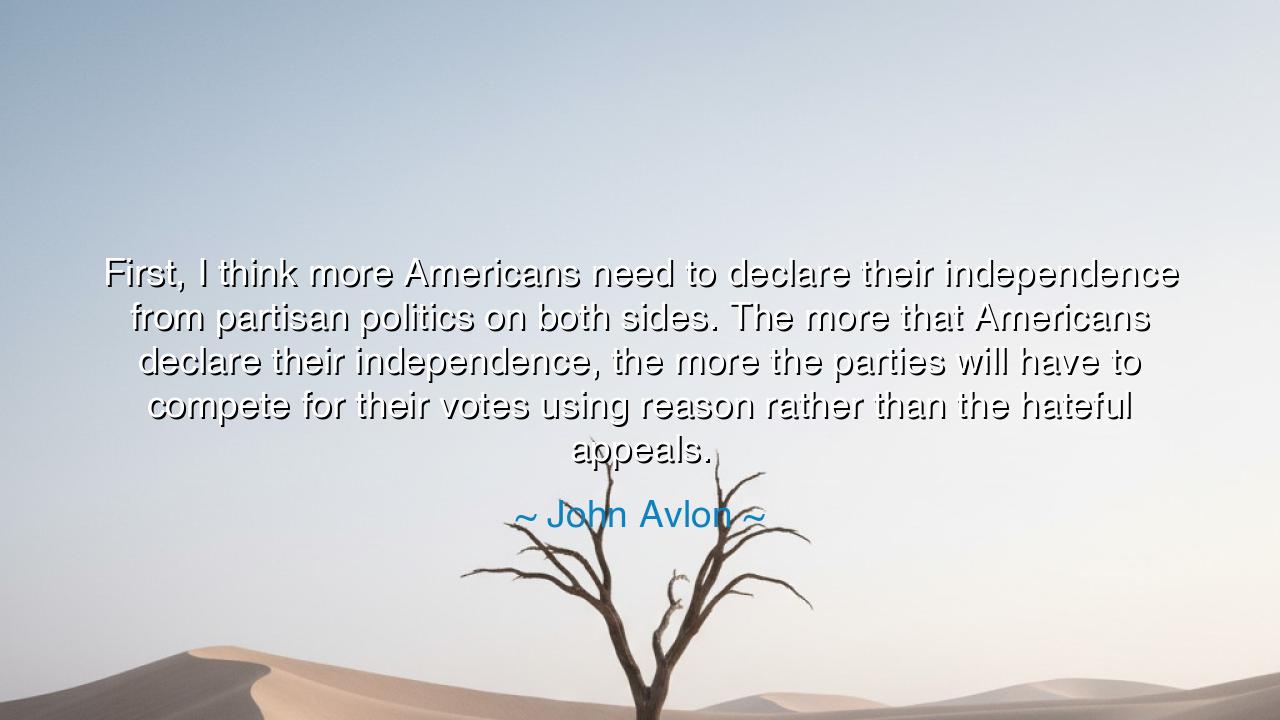
First, I think more Americans need to declare their independence
First, I think more Americans need to declare their independence from partisan politics on both sides. The more that Americans declare their independence, the more the parties will have to compete for their votes using reason rather than the hateful appeals.






The Independence of the Mind
Hear the voice of John Avlon, a modern seeker of balance in a time of division, who declared:
“First, I think more Americans need to declare their independence from partisan politics on both sides. The more that Americans declare their independence, the more the parties will have to compete for their votes using reason rather than the hateful appeals.”
These words, though spoken in an age of noise and argument, echo with the clarity of ancient wisdom. For they speak not merely of politics, but of the freedom of the mind, of the sacred duty of every citizen to think beyond the banners of tribe and faction. Avlon calls not for rebellion, but for awakening—for the courage to see clearly in a world clouded by loyalty and anger.
The Meaning of True Independence
In his words, independence is not isolation; it is the liberation of judgment. To “declare independence” from party is to reclaim the power that belongs to the people, to resist the pull of blind allegiance. The ancients would have recognized this as the virtue of discernment—that golden mean between chaos and conformity. For democracy dies not when enemies invade, but when citizens surrender their minds to passion and prejudice.
Avlon’s call is thus a restoration of the original spirit of the republic—the spirit that once guided the founders who broke from kings not for power’s sake, but for principle. They believed that reason should be the light of governance, that men and women should weigh truth by evidence, not by echo.
The Origin of the Thought
Avlon’s wisdom was born of watching a nation fracture under the weight of partisan hatred. His appeal is to conscience, not to ideology. In his time, as in the times of Rome and Athens before, public discourse had become a battleground of factions, each shouting louder, each claiming virtue while despising the other. He saw, as every philosopher sees, that division grows when reason fades.
To “declare independence,” then, is to perform a revolution of the spirit, akin to that first American Revolution when a people chose freedom over fear. But now, the tyranny to overthrow is not foreign rule—it is the tyranny of rage, of partisanship that blinds the heart and deafens the ear.
The Lessons of History
Consider the example of George Washington, who, after leading his people to liberty, refused to bind them to himself. He warned the young nation against “the baneful effects of party spirit,” for he saw in factionalism the seeds of destruction. His counsel was prophetic: that the Republic would endure only so long as citizens valued reason over resentment, and unity over blind allegiance.
So too, in the Roman Senate, wise men like Cicero pleaded for moderation while extremists on both sides tore their nation apart. In their failure to heed reason, the republic crumbled and gave way to empire. Thus, Avlon’s warning stands in the ancient line of such voices: he calls us to the middle path—the path of wisdom, where truth is loved more than victory.
The Power of Reason Over Rage
Avlon’s hope is both humble and heroic: that citizens might once again listen, think, and deliberate as free minds. For when people become independent in thought, they cannot be swayed by the hateful appeals of demagogues. They become immune to manipulation, guided instead by reason, that divine faculty which the ancients called the breath of the gods within man.
The wise ruler fears the reasoning citizen, for such a one cannot be controlled by fear or flattery. And so, Avlon’s vision is revolutionary—not of arms, but of intellect. He dreams of a nation reborn not through conquest, but through clarity, where truth is measured by thought, not by tribe.
The Call to the Modern Citizen
Let all who hear these words take them to heart: to be truly free is to think freely. Do not let your convictions be inherited without question or given without reason. To follow a cause is noble; to follow blindly is peril. The mind, like the body, withers when it is not exercised. Seek truth as the philosophers sought virtue—not for advantage, but for the soul’s own health.
When you hear the roar of partisanship, withdraw into reflection. When you are told to hate, ask “why.” When others speak only of sides, speak of solutions. For the wise citizen serves not a party, but the common good, and the common good is the highest law of any free people.
The Eternal Lesson
Thus, Avlon’s teaching is an ancient truth reborn for a modern age: that independence of thought is the cornerstone of all liberty. Freedom without reason is chaos; unity without independence is tyranny. Each person must become their own philosopher, weighing each claim against conscience and evidence.
For the destiny of nations is shaped not by armies or rulers, but by the hearts of their citizens. So, let each one declare their own independence—not from their country, but from ignorance and hatred. Let reason once more become the measure of the land, and the Republic will rise renewed, shining again as a testament to the power of the free and thoughtful soul.






AAdministratorAdministrator
Welcome, honored guests. Please leave a comment, we will respond soon